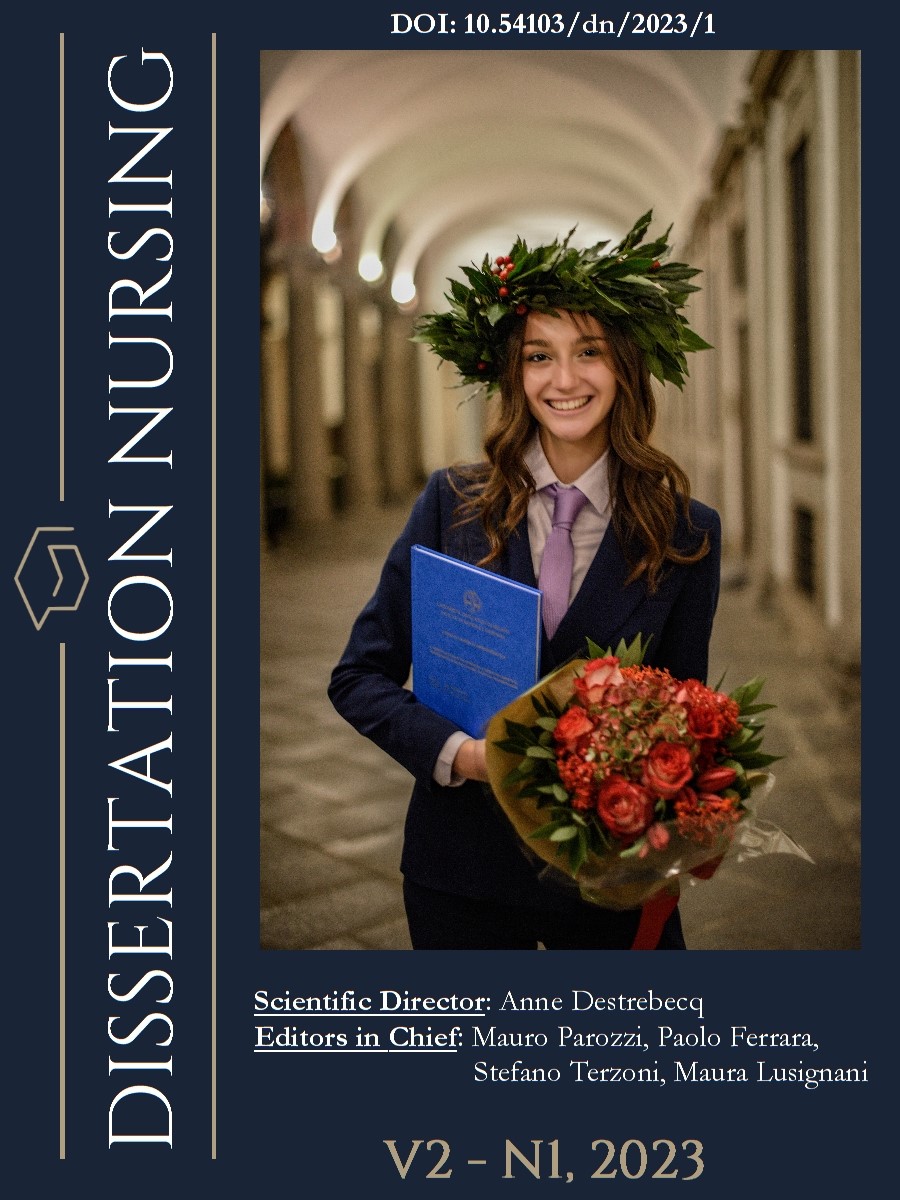Il livello di soddisfazione lavorativa in un campione di infermieri neolaureati.
DOI:
https://doi.org/10.54103/dn/18712Parole chiave:
soddisfazione lavorativa, infermieri neolaureatiAbstract
BACKGROUND: La carenza globale rende gli infermieri neolaureati (NGN) una risorsa preziosa per il sistema sanitario che richiede professionisti preparati e pronti nell’immediato. Il periodo di transizione dall’ambiente accademico a quello lavorativo può comportare stress, insoddisfazione, esaurimento e intenzione di abbandonare. È dimostrato che ambienti di lavoro positivo contribuiscono al miglioramento dell’autonomia, della soddisfazione e della collaborazione all’interno del team.
OBIETTIVI: Valutare il livello di soddisfazione lavorativa in un campione di NGN dell’Università degli Studi di Torino sede Asti.
METODI: Con disegno di studio osservazionale monocentrico è stato analizzato un campione di 159 NGN laureati tra il 2016 e il 2021. A tale scopo è stata utilizzata la Index of Work Satisfaction di Stamps (IWS). Per l’analisi dei risultati e stata utilizzata l’analisi fattoriale esplorativa (AFE).
RISULTATI: Complessivamente le percentuali di punteggi positivi, neutri e negativi erano rispettivamente 29.6%, 57.9% e 12.6%. L’Autonomia ha ottenuto media di 5.42 (DS±0.937), l’Interazione con i colleghi infermieri media di 5.14 (DS±1.42), lo Status professionale media di 4.77 (DS±1.18), le Competenze richieste dal ruolo media di 2.98 (DS±1.05) e la Retribuzione media 2.69 (DS± 0.945).
DISCUSSIONE: Gli indici di soddisfazione sono intorno a valori mediani. Dalle singole dimensioni emergono differenze significativamente positive, in particolare per l’Autonomia, lo Status professionale e le Interazioni, sia con i medici che con i colleghi infermieri. Al contrario Retribuzione, Competenze richieste dal ruolo e Politiche organizzative mostrano insoddisfazione.
Downloads
Riferimenti bibliografici
https://www.fnopi.it/wp-content/uploads/2021/05/SCHEDA-INFERMIERI-12-maggio.pdf (ultima consultazione: 18/02/2022)
https://nursetimes.org/tutti-dati-del-business-infermieristico-universita-fabbrica-laureati-disoccupati/28189 (ultima consultazione: 16/02/2022)
Kim E, Yeo JH. Transition shock and job satisfaction changes among newly graduated nurses in their first year of work: A prospective longitudinal study. J Nurs Manag. 2021; 29:3, 451-58
Boamah SA, Read EA, Spence Laschinger HK. Factors influencing new graduate nurse burnout development, job satisfaction and patient care quality: a time-lagged study. J Adv Nurs. 2017; 73:5, 1182-95
https://www.igorvitale.org/la-definizione-di-soddisfazione-lavorativa-in-psicologia-del-lavoro/ (ultima consultazione: 19/02/2022)
Ulupinar S, Aydogan Y. New graduate nurses' satisfaction, adaptation and intention to leave in their first year: A descriptive study. J Nurs Manag. 2021; 29:6, 1830-40
Chang W-Y, Ma J-C, Chiu H-T et al. Job satisfaction and perceptions of quality of patient care, collaboration and teamwork in acute care hospitals. J Adv Nurs. 2009; 65:9, 1946-55
https://docplayer.it/55550309-La-soddisfazione-lavorativa-del-personale-infermieristico-adattamento-italiano-della-scala-index-of-work-satisfaction-di-stamps.html (ultima consultazione: 19/02/2022)
Laschinger HKS, Zhu J, Read E. New nurses’ perceptions of professional practice behaviours, quality of care, job satisfaction and career retention. J Nurs Manag. 2016; 24:5, 656-65
Labrague LJ and Santos JAA. Transition shock and newly graduated nurses' job outcomes and select patient outcomes: A cross-sectional study. J Nurs Manag. 2020; 28:5, 1070-9
Hussein R, Salamonson Y, Everett B et al. Good clinical support transforms the experience of new graduates and promotes quality care: A qualitative study. J Nurs Manag. 2019; 27:8, 1809-17
Pineau Stam LM, Laschinger HKS, Regan S et al. The influence of personal and workplace resources on new graduate nurses’ job satisfaction. J Nurs Manag. 2015; 23:2, 190-9
Fallatah F, Laschinger HKS. The influence of authentic leadership and supportive professional practice environments on new graduate nurses’ job satisfaction. J Res Nurs. 2016; 21:2, 125-36
Cheng C, Liou S, Tsai H et al. Job stress and job satisfaction among new graduate nurses during the first year of employment in Taiwan. Int J Nurs Pract. 2015; 21:4, 410-8
Salem Alghamdi M, Ghazi Baker O. Identifying the experiences of new graduate nurses during the transition period to practice as a professional nurse. J Clin Nurs. 2020; 29:15/16, 3082-8
Kim JH and Shin HS. Exploring barriers and facilitators for successful transition in new graduate nurses: A mixed methods study. J Prof Nurs. 2020; 36:6, 560-8
Feng R-F and Tsai Y-F. Socialisation of new graduate nurses to practicing nurses. J Clin Nurs. 2012; 21:13-14, 2064-71
Read EA and Laschinger HKS. The influence of authentic leadership and empowerment on nurses’ relational social capital, mental health and job satisfaction over the first year of practice. J Adv Nurs. 2015; 71:7, 1611-23
https://www.fnopi.it/2021/11/11/ocse-2021-healthataglance/ (ultima consultazione: 18/02/2022)
Yu M and Lee H. Impact of resilience and job involvement on turnover intention of new graduate nurses using structural equation modeling. Jpn J Nurs Sci. 2018; 15:4, 351-62
Dowloads
Pubblicato
Come citare
Fascicolo
Sezione
Licenza
Copyright (c) 2023 Chiara Ferrero, Giorgio Bergesio

Questo lavoro è fornito con la licenza Creative Commons Attribuzione - Non commerciale - Non opere derivate 4.0 Internazionale.
Accettato 2022-11-04
Pubblicato 2023-01-30

















